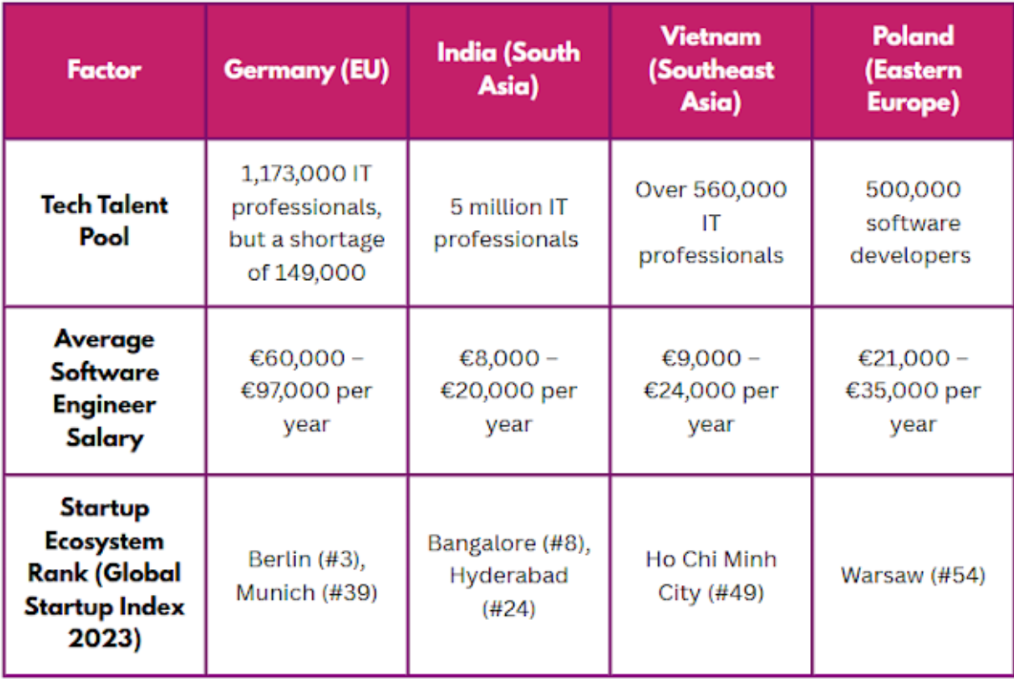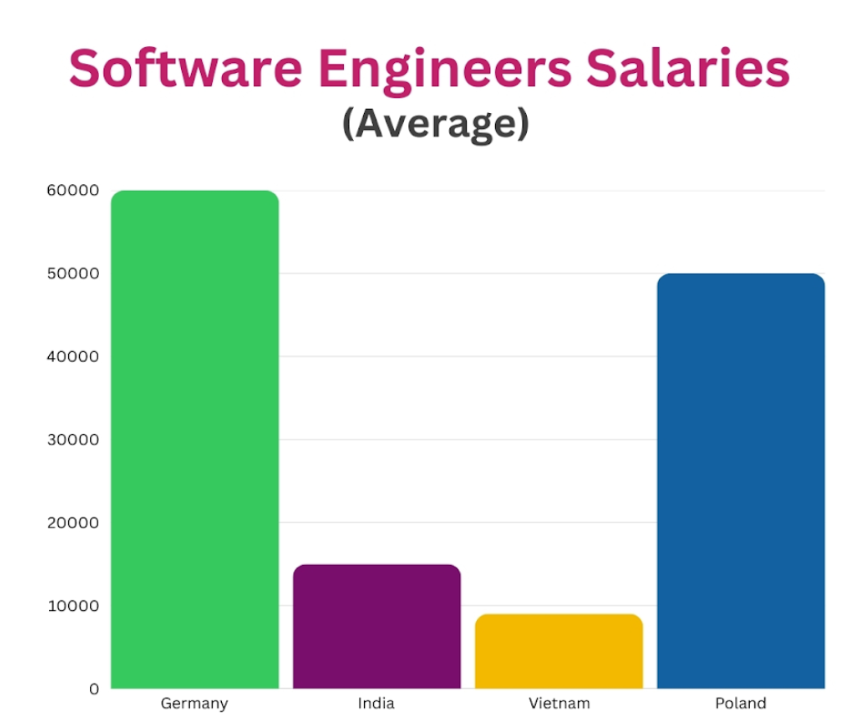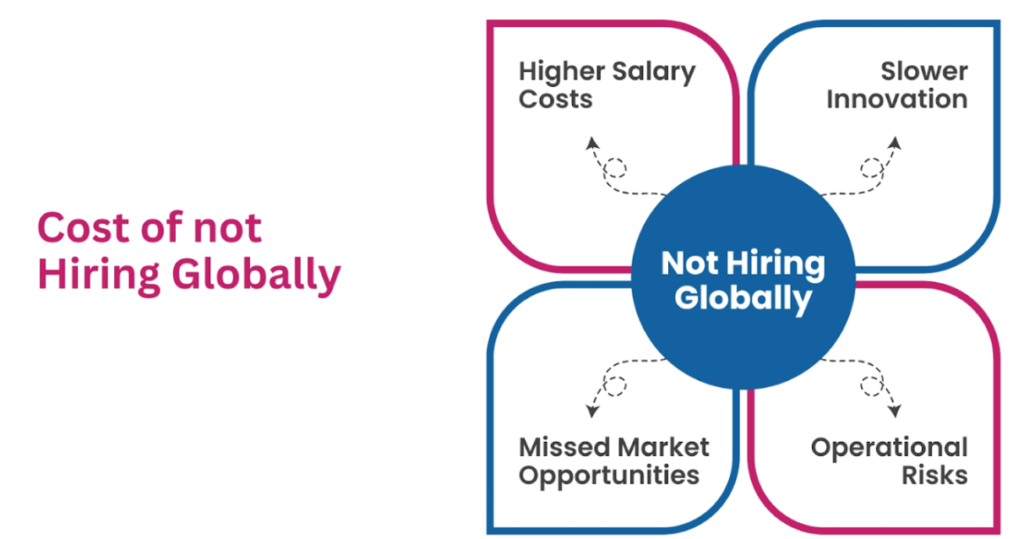
The Global Shift in Tech Talent: Where Do the Best Developers Come From?
Germany, a long-standing leader in engineering and industrial technology, is now facing a significant IT talent shortage. With an aging workforce, rising salary demands, and a limited supply of highly skilled developers, businesses are struggling to recruit the expertise necessary for emerging fields such as artificial intelligence, cloud computing, and fintech. Recent studies indicate that Germany will need 780,000 additional IT professionals by 2026 to sustain its digital transformation ambitions (McKinsey, 2022). However, the local market alone cannot meet this demand, forcing companies to explore global hiring strategies.
This article explores the key drivers of the global tech talent shift, with a focus on German companies expanding their hiring beyond the EU. It highlights the most promising non-EU talent hubs and explores how international recruitment can help German businesses stay competitive in the rapidly evolving digital economy.

Key Factors Why the Global Tech Talent Market is Shifting
1. Robust STEM Education & Research
One of the biggest factors fueling the rise of new tech powerhouses is strong investment in STEM (Science, Technology, Engineering, and Mathematics) education. Countries like India, Vietnam, and Nigeria have dramatically increased the number of engineering graduates, creating a new generation of highly skilled software developers.
- India alone produces over 1.5 million engineering graduates annually, many of whom specialize in computer science and IT.
- Pakistan ranks 4th globally in freelance software development, showcasing the growing influence of self-taught and formally trained developers.
- Eastern European nations such as Poland and Ukraine consistently rank among the top in coding competitions like TopCoder and HackerRank.
These education systems emphasize mathematics, logical reasoning, and hands-on coding experience, equipping developers with the skills needed to work in cutting-edge fields like AI, blockchain, and cybersecurity.
2. Supportive Government Policies & Investments
Many non-EU countries are actively encouraging the growth of their technology sectors. Governments in India, Vietnam, Nigeria, and the UAE have launched tech-focused policies that provide financial incentives, tax breaks, and infrastructure support for startups and multinational R&D hubs.
For example:
- Vietnam’s technology industry generated approximately 141 billion EUR in revenue in 2022, driven by state-backed incentives for software exports.
- Egypt’s startup ecosystem is expanding rapidly, with government-backed digital initiatives driving major investments in AI and fintech.
- The UAE has launched a 95 billion EUR AI investment firm (MGX) to accelerate AI-driven innovation across industries.
3. Thriving Startup Ecosystems
While outsourcing was once the primary tech opportunity in mainly emerging markets, local startup ecosystems are now thriving. Cities like Bangalore, Jakarta, Lagos, and Warsaw have become innovation hubs where developers work on high-impact projects in AI, fintech, e-commerce, and enterprise software.
- Bangalore houses over 2,400 startups, making it Asia’s Silicon Valley and a center for fintech innovation.
- Lagos, Nigeria, is home to Flutterwave and Paystack, two of Africa’s most valuable fintech unicorns, demonstrating the rapid digital transformation across the continent.
- Warsaw’s booming IT sector has attracted multinational firms looking for cost-effective but highly skilled development teams.
4. Favorable Demographic Trends
One of the key factors that will sustain this shift in tech talent is demographics.
- Many emerging markets boast young populations eager to learn, adapt, and innovate in software development.
- In Nigeria, 60% of the population is under the age of 25, making it one of the fastest-growing markets for tech talent.
- Vietnam and Indonesia have seen rapid increases in the number of developers, driven by government investments in digital education.
A young, tech-savvy workforce ensures that these markets will remain highly competitive in the coming decades, meeting the evolving demands of the global tech industry.
Top Emerging Non-EU Tech Hubs
1. South Asia
South Asia has been a key player in global software development for decades. The region’s large number of engineering graduates, established outsourcing industry, and growing startup scene make it a prime destination for tech talent.
India
- Home to 5.8 million software engineers and 68 unicorn startups in fintech, e-commerce, and AI.
- Bangalore, known as “Asia’s Silicon Valley,” is a global center for AI, fintech, and enterprise software development.
- Is home to over 2,400 startups, making it a major startup hub comparable to Berlin, housing major research & development (R&D) centers for global tech giants like Google, Microsoft, and Adobe (The Scalers, 2020).
- Leading AI and fintech startups, such as Flipkart and Razorpay, drive innovation at a scale similar to Germany’s fintech leaders like N26.
- Hyderabad, a hub for cloud computing and AI research, houses Amazon, Microsoft, and Apple R&D centers.
- Home to T-Hub, one of India’s largest startup incubators. Comparable to Berlin’s startup ecosystem, T-Hub plays a role similar to Germany’s Fraunhofer Institutes by fostering deep-tech innovation and supporting startups in AI, fintech, and enterprise software.
India’s 68 unicorn startups span across fintech, e-commerce, and SaaS (Software as a Service), reinforcing its reputation as a global tech leader (Hurun India Unicorn Index, 2023).
Pakistan
Pakistan is emerging as a key player in global software development, with Lahore, Karachi, and Islamabad driving the IT sector.
- Ranks 4th globally in freelance software development, with expertise in AI, fintech, and mobile applications.
- IT exports are projected to reach 9.5 billion EUR by 2025, highlighting its rapid growth.
Bangladesh
- Bangladesh has become one of the fastest-growing IT outsourcing destinations, with its ICT sector generating 1.2 billion EUR in export revenue.
- The country’s IT export sector has seen remarkable growth, with earnings reaching 565 million EUR in the 2021–2022 fiscal year—a staggering 95% increase from the previous year.
2. Southeast Asia & East Asia
Vietnam
- Generated 141 billion EUR in tech revenue in 2022, with major investments in enterprise software, cybersecurity, and AI-driven applications.
- Hanoi and Ho Chi Minh City are emerging as key outsourcing destinations for global tech firms.
Indonesia
Significant government investments in 5G infrastructure, AI-driven banking solutions, and digital payment platforms are accelerating fintech growth and attracting global investors.
- Jakarta is home to Gojek and Tokopedia (Indonesia’s equivalents of Uber and Amazon), two of Southeast Asia’s biggest startups, with a thriving fintech and e-commerce sector.
China
China remains a global leader in AI research, deep learning, and semiconductor technology, with Beijing and Shenzhen housing some of the world’s top technology firms.
- Leads the world in AI research, publishing more top-cited AI papers than any other country, demonstrating its dominance in artificial intelligence advancements (Business Standard, 2022).
- Heavy investment in robotics, deep learning, and semiconductors has propelled rapid expansion. In 2023, China’s semiconductor market generated over 502 billion EUR in global sales (The China Academy, 2024).
3. Africa
Nigeria
- Home to Africa’s giant fintech startups, including Flutterwave and Paystack.
- Fintech investment in Nigeria reached 1.1 billion EUR in 2023, the highest in Africa.
- Digital banking adoption is rising, with over 45% of Nigerians now using online financial services.
Egypt
- Cairo’s startup scene is valued at 7.9 billion EUR , making it a top destination for tech talent in the Middle East and North Africa.
- In 2024, Egyptian startups secured 313 million EUR across 78 funding rounds, positioning Egypt as a leader in Africa’s startup landscape (Business Today Egypt).
4. Eastern Europe
Although some Eastern European nations are part of the EU, many operate outside EU hiring frameworks while developing strong technology sectors.
Poland
- Has become a hub for software engineering and cybersecurity, attracting companies looking for high-quality, cost-effective developers.
- Warsaw and Kraków, much like Berlin and Munich, lead the country’s thriving IT sector, with strengths in fintech, AI, and cloud computing.
- Poland boasts over 500,000 ICT specialists,and more than 600,000 IT enterprises, making it Eastern Europe’s largest tech talent pool.
Ukraine
- Ukraine produces 30,000 tech graduates annually, with its IT workforce expected to exceed 250,000 by 2025, ensuring a steady supply of skilled professionals.
Romania
- Ranks 6th globally in certified IT professionals, surpassing larger economies like the US and Russia in per capita density.
- The embedded software development market in Romania exceeded 14.3 billion EUR in 2022 and continues to expand.
Comparing Emerging Tech Hubs with EU Market (Germany)

Key Takeaways
- Talent Supply & Cost Efficiency
- Germany faces a severe IT talent shortage.
- India and Vietnam offer massive talent pools with 5M+ IT professionals.
- Hiring globally allows companies to reduce costs by 60-80% while maintaining expertise.
- Talent Supply & Cost Efficiency
- Startup Ecosystem & Innovation
- Bangalore ranks higher than Munich in the Global Startup Index, reflecting its strong tech startup culture and funding ecosystem.
- Poland’s growing tech industry provides a nearby outsourcing advantage for German firms looking for a closer alternative.

Why Global Hiring is the Future of Innovation
The next decade will be defined by the companies that embrace a borderless approach to hiring. The most successful organizations will be those that:
- Leverage global diversity to build stronger, more creative, and well-rounded engineering teams.
- Tap into emerging tech talent from India, Vietnam, Nigeria, and Eastern Europe to gain access to cutting-edge expertise.
- Utilize cost-effective hiring strategies to stretch their budgets without compromising on quality.
- Expand market insights by hiring developers from different regions who bring unique perspectives on fintech, AI, cloud computing, and enterprise solutions.
Tech innovation today is no longer constrained by geography. Remote work, cloud-based collaboration tools, and advanced project management systems allow companies to seamlessly integrate talent from across the world. This Overcoming the Challenges of Global Hiring
While hiring internationally unlocks access to top-tier talent and innovation, it also introduces operational, legal, and cultural complexities that companies must proactively address. Without the right strategies in place, managing a global team can become overwhelming. However, partnering with the right hiring platform can turn these challenges into opportunities.
- Legal & Compliance Issues – Navigating local employment laws, tax regulations, and visa requirements can be complex and time-consuming. Talents2Germany simplifies this process by handling compliance, payroll, and contract management, ensuring that German companies can seamlessly integrate international talent without legal risks or administrative burdens.
- Cultural Differences & Communication Barriers – Building a globally distributed team requires more than just technical skills—it demands cultural alignment and effective collaboration. Talents2Germany provides structured onboarding support, cultural training, and language assistance, helping teams overcome cross-cultural barriers and work cohesively in diverse environments.
- Time Zone & Workflow Management – Managing distributed teams across multiple time zones requires optimized scheduling, asynchronous communication strategies, and efficient workflow automation. Talents2Germany helps companies implement best practices for global team coordination, ensuring seamless productivity and collaboration without workflow disruptions.
Germany’s Opportunity in the New Global Tech Landscape
Germany has long been a pioneer in engineering, manufacturing, and industrial technology. However, to maintain its competitive edge in the digital economy, it must adapt to the realities of global hiring. By looking beyond the EU for software engineers, AI specialists, and cloud experts, German startups and enterprises can:
- Overcome talent shortages by accessing highly skilled engineers who are eager to work on cutting-edge projects.
- Reduce hiring costs while maintaining quality, ensuring that budgets are allocated efficiently.
- Strengthen their innovation capacity by fostering a team that blends global expertise with local industry knowledge.
- Expand into new markets more effectively by hiring engineers who understand regional consumer behaviors, tech ecosystems, and regulations.

In an era where digital transformation defines industry success, businesses that embrace global hiring will gain a decisive advantage over those that do not. Companies that hesitate to expand their talent pool beyond traditional hiring markets will find themselves struggling to keep pace with competitors who are already building internationally diverse, highly skilled teams.
Conclusion: The Future of Global Tech Hiring – A Strategic Imperative
For German companies, hiring beyond the EU is no longer optional—it’s a necessity. The severe shortage of IT professionals, combined with rising salaries and intense competition, has made it increasingly difficult to find local developers with specialized expertise.
To stay competitive, companies must embrace this shift and proactively integrate international talent. Once considered outsourcing destinations, emerging tech hubs are now innovation powerhouses, producing some of the most skilled and adaptable developers in AI, fintech, and enterprise software. Firms that fail to tap into these talent pools will struggle to keep pace in an industry driven by innovation and agility.
By diversifying tech teams, unlocking access to world-class talent, and fostering collaboration across borders, businesses can future-proof their workforce and drive sustained growth in the digital economy.
Are you ready to build a future-ready tech team?
🚀 Your competitors are already hiring top talent worldwide. Don’t fall behind—build your global tech team today!
📩 Contact Talents2Germany now to connect with elite developers and future-proof your business!



